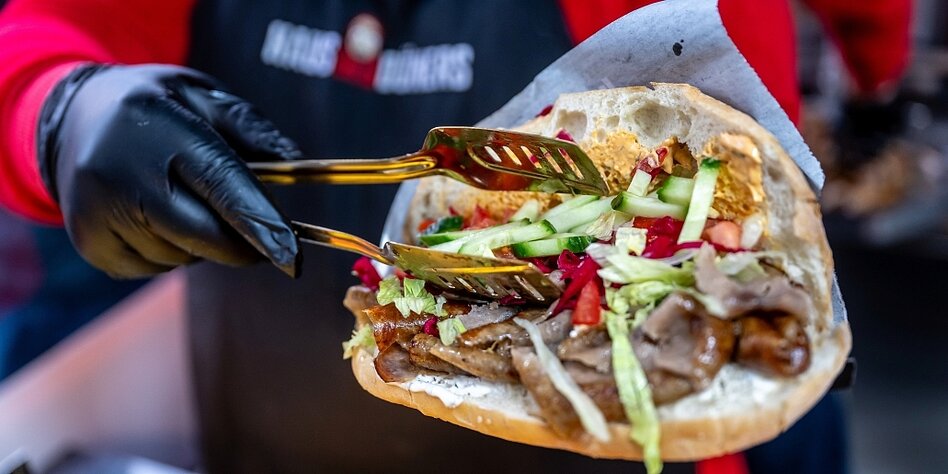A Turkish association wants the kebab to be recognised as a cultural asset by the EU. However, it ignores the history of its cross-cultural origins.

The kebab. There are attempts at cultural appropriation from the nationalist side Photo: Martin Möller/Funke Photo Services/imago
The application of the International Doner Federation (Udofed) to join the EU is a general attack on the Germans' favourite dish. An attack on the cultural identity of this country.
Istanbul-based Udofed wants the EU to protect kebab as a “traditional speciality”. With precise rules on what meat can be used (not beef!), how thick the slices of meat can be cut (0.2 to 0.5 millimetres), how many grams of onion, salt, pepper and thyme can be put on a kebab and how long the kebab knife must be made of “special stainless steel” – 55 centimetres.
This app is an attempt to reorganize the kebab world, which has been developed, designed and measured by German-Turkish kebab makers for decades: authoritarian, by setting standards from Turkey from above, with nationalistic ideas of purity and ownership.
None of this is surprising, as the Istanbul Association was founded in 2019 by Mehmet Mercan, the former Istanbul leader of the Great Unity Party (BBP), a far-right Islamist nationalist party. The BBP is accused, among other things, of being involved in the murder of Armenian-born publicist Hrant Dink. Although Mecan died in 2023, he launched the initiative for the EU application in 2022.
The proposal of the International Doner Federation ignores the fact that the doner kebab is not a Turkish invention, but a product of the Ottoman Empire, where Turks, Greeks, Albanians, Jews, Armenians, Kurds and Arabs peered into each other's pots and stole from each other and learned. The result is the trinity: kebab-gyros-shawarma.
When Turkish guest workers brought the doner kebab to Germany, they continued cross-cultural tolerance. They took something they knew from Turkey and created something completely new: the German Döner! The German kebab as we know it today.
You don't have to like it, you might want it to be of better quality, but one thing is certain: the German kebab is a democratic product. Millions of people were involved in a participatory process in its current form. The German kebab is exactly what people want it to be. That's why it's popular, that's why it's a worldwide success, that's why it's an export success from Germany and not from Turkey. It was not the kebab producers from Turkey, but the German Turks who developed very complex production systems and processes for kebab skewers, with which they supply all of Europe, Dubai, the USA and Canada.
Interestingly, the initiators of the application did not contact kebab producers in Germany in advance to coordinate with them. The Association of Turkish Doner Kebab Manufacturers in Europe, founded in Berlin in 1996, rejects the Istanbul application.
Incidentally, Germany has long had something of a purity law for doner kebabs, which sets minimum standards for what a kebab may contain. The “Berlin marketing concept for the meat product Döner Kebab” was adopted in Berlin in 1989 and has theoretically been valid nationwide since 1991. Istanbul’s application simply comes too late.
